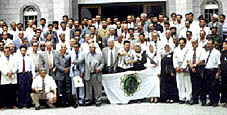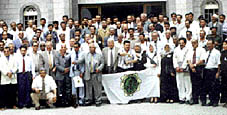
The First Conference On Environment & Human Resources [Archives:2000/17/Health]
April 24 2000
By: Yemen Times Staff, Taiz
The first conference on environment and natural resources concluded last Monday at Taiz University. More than 120 researchers attended the conference held under the motto “Towards A Pollution-Free Environment.” During the conference 94 researches were discussed. The conference came out with a number of relevant recommendations on environment, water resources, etc.

Dr. Ali Al-Mikhlafi, vice president of Taiz University for academic affairs said that the conference was held for the first time in Yemen to discuss what has been achieved in the environment domain. “Environment issues are of high importance because they are related to man and his health. We are very proud that the conference is held in Taiz, a city suffering of from environmental pollution and lack of water resources. We are very aware of all of this and this in fact what has motivated us to publish the Environment newspaper. We are even planning to establish a society for environment protection. I hope that universities would help raise the students’ awareness of environment,” Al-Mikhlafi added.
Dr. Abdul Salam Al-Gawfi Vice president of Ibb University commented by saying: ” All sectors of people must take care of the environment and improving environmental awareness is an issues of concern for all sectors of the people. Holding such conferences signals the existence of awareness and danger at the same time. It ushers an awareness of the volume of the problem. They realize the real danger awaiting the present and future generations from the ozone depletion and pollution of seas and oceans. It is good that educational authorities have realized that this problem must not be ignored.
Holding the conference in Taiz was a good idea because the city suffers more than the others from pollution due to many factories that affect the environment very much besides the problem of water shortages and the low rate of rainfall.
Yemen is very poor in water resources. While the European individual’s share of water ranges between 1000 to 3000 cubic meters, it is only 300m in Yemen. This is a dangerous indicator, especially when taking into consideration that the population of Yemen will amount to 30 million people in 2025. The individual’s share of water will consequently fall to 250 cubic meters.
During the conference I presented an evaluation of rain water and wells in Ibb. More than 150 thousand watt in a year is used by water pumps. If well water is mixed with rain water we will not only get pure water with universal standards but we will also save 150 thousand kilowatt of power.”Dr. Abdul Aal, Asiot University, Egypt said that the conference was a success and it had accomplished some of its objectives. “One of the main objectives was to get Arab environmentalists and specialists in environmental sciences come together to discuss the ideas they have got in the field. Another objective is increasing people’s awareness of environment problems. People are after luxury and comfort and they sometimes use means that damage environment. Therefore, conferences are not enough because we will need to shift the focus to ordinary people through the media.
Pollutants are many. The most dangerous are factories’ wastes, car fumes, airplanes, ships, etc.
As far as Yemen is concerned, I think that its air is fresher than that of the other Arab countries. The mountains help reduce pollution. However, I have noticed that garbage is scattered in the streets. People must be aware that there are specific places where they can throw garbage in,” Abdul Aal added.
Dr. Nageebah Mutahar, Taiz University said that the conference recommendations did not cover all environmental issues especially those related to Taiz. She pointed out the devastating damage to arable land resulted from factories waste, referring to a study made by students of geology which concluded that factories waste damaged more than 20 square kilometers of arable land. Moreover, most of the fruits have become tasteless for the same reason. “If the authorities in Taiz do not try to solve this problem Taiz will be at risk,” she concluded.
——
[archive-e:17-v:2000-y:2000-d:2000-04-24-p:./2000/iss17/health.htm]


